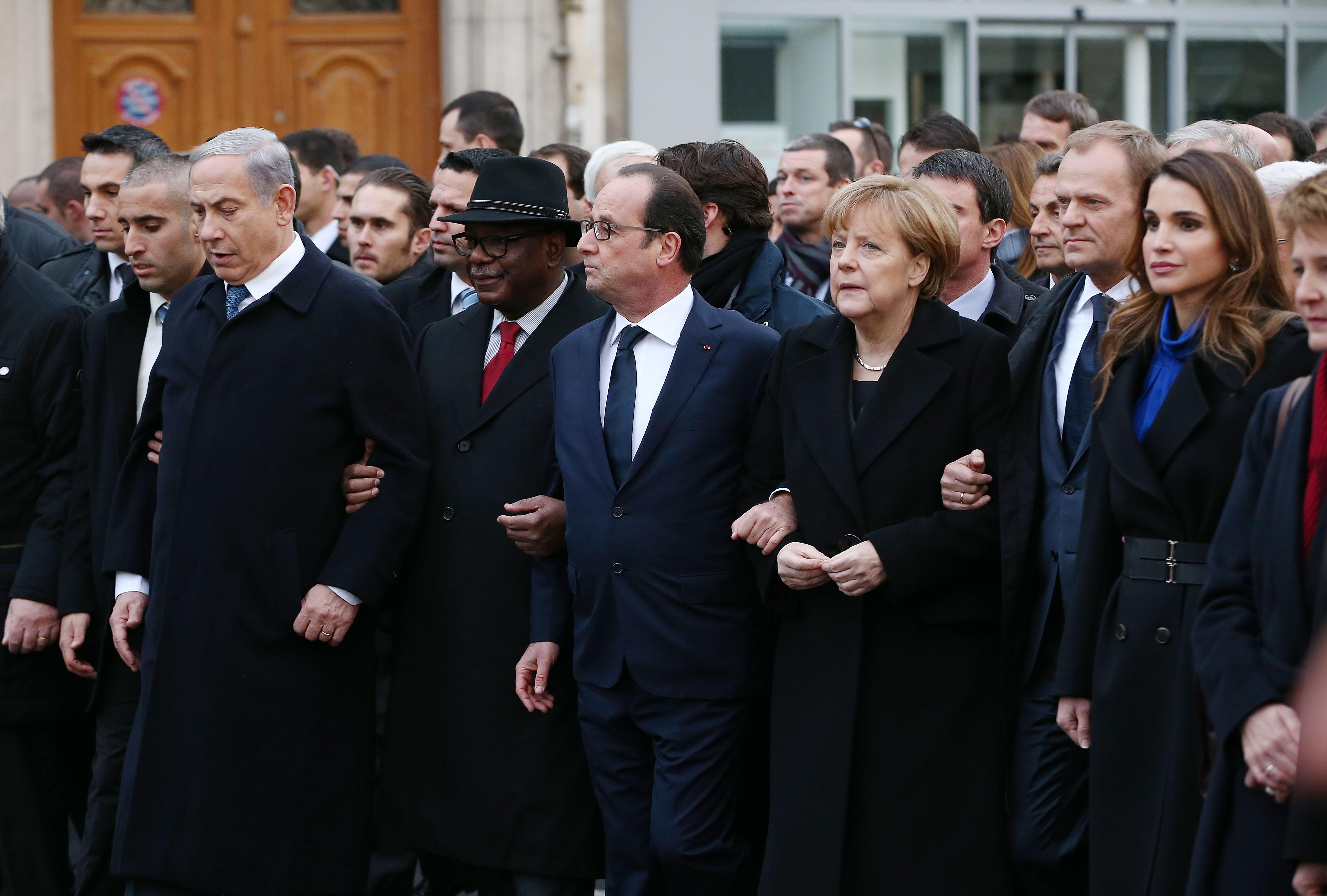Why do they hate our freedoms so much, anyway?
I’m not talking about the murderers who cut their destructive swath through Paris last week, or their beyond-radical acolytes and advocates who think speech should be a capital offense. No, this is about the people who say they believe in liberty but rarely pass on an opportunity to carve at its foundations.
They include the political leaders who gathered in Paris this past weekend to talk about security and claim solidarity with the journalists, police, and bystanders who lost their lives in the violence. Many of these leaders govern speech and journalism in their own nations with anything but a light touch—“press predators,” as Reporters Without Borders aptly called them—and now insisted it was essential to increase surveillance over everything and everyone. As a brilliant cartoon at the Guido Fawkes blog, citing London School of Economics student Daniel Whickham’s aggregation of these leaders’ actual behavior, “quoted” them, “Nous sommes hypocrites.”
Among those leaders were heads of Western democracies, including the United Kingdom’s David Cameron, whose nation has been on a long slide into surveillance-state status. This week Cameron, who has amply demonstrated his contempt for journalism about national security issues, surprised no one by vowing to ban secure applications that don’t offer backdoors for government snoops.
In the United States, the National Security Agency’s hometown member of Congress, C.A. Dutch Ruppersberger, D-Md., floated a proposal to bring back computer security legislation, or some form of it, that would absolutely shred online privacy. He’ll clearly have support from the Obama administration, which has repeatedly supported pervasive surveillance despite the Edward Snowden revelations. At least the administration, which has also touted freedom of speech while waging a war on leaks and the journalists who receive them, didn’t flout its hypocrisy by sending a top official to the Paris march (though it has since apologized for not sending a representative).
All of this activity is completely predictable. It is how security statists work. I wouldn’t accuse them of wanting terrorists to strike, but the minute anything bad happens, they leap in front of the nearest TV camera to insist that the only way to save freedom is to whack away at it.
So I ask again, why do they—and the useful idiots in the right-wing media who echo their spy-on-everyone proposals—hate our freedoms so much?
They’d claim they don’t, of course. Why, they absolutely love (some) liberties, they insist. And they always couch their attacks on our rights as a balancing act, in which we, the people, agree to modify or give up certain freedoms in order to have more security. Yet the balance is illusory when you look at the fine print. Pervasive surveillance and draconian laws have a ratchet effect: A surveillance state where everyone is guilty of something is made to order for those who like to control us.
So are these politicians simply cynical? I can’t read their minds, but I can read their speeches and proposed laws. If they are telling the truth about what they actually believe, they genuinely don’t think we can afford traditional liberties anymore. And they genuinely believe that they their security services won’t run amok with the new powers they’ve been given or have simply claimed without legislative or judicial approval. If so, they are zealots who mean well. The fact that their fixes, such as banning encryption, can’t possibly work is beside the point. In their minds they have no choice but to try.
Cameron’s insistence that encryption and other technology must have backdoors is flatly unworkable. As every competent expert in the field can explain, backdoors inevitably introduce more insecurity that criminals will exploit, and governments always abuse their powers. We’ve seen again and again that there is little to no accountability for government abuses, and nothing seems likely to change that dismal reality.
The reality-based community reacted as you’d expect to Cameron’s proposal. Marc Andreessen, a Web pioneer and investor, tweeted that the U.K. was declaring war “on its own tech sector & ability for its citizens & businesses to secure themselves vs cyberattack.”
Here and there, a politician will stand up and speak the truth: With freedom comes some risk. If we allow criminals to scare us into curbing the rights that are the true source of our national strength—we’ve done that repeatedly in the past few decades—we’ve given up on liberty. Let’s not.
